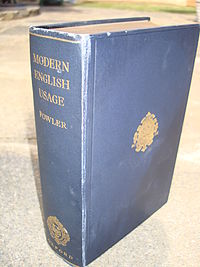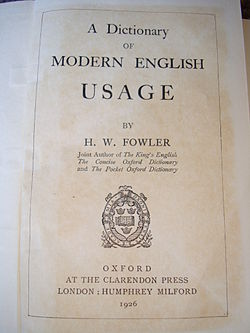- A Dictionary of Modern English Usage
-
A Dictionary of Modern English Usage 
Author(s) H. W. Fowler Country United Kingdom Language English Publisher Oxford University Press Publication date 1926 A Dictionary of Modern English Usage (1926), by Henry Watson Fowler (1858–1933), is a style guide to British English usage, pronunciation, and writing. Ranging from plurals and literary technique to the distinctions among like words (homonyms, synonyms, etc.), to the use of foreign terms, it became the standard for most style guides that followed; thus, the 1926 first edition remains in print despite the existence of the 1965 second edition, and the 1996 and 2004 printings of the third edition, which was mostly rewritten as a usage dictionary incorporating corpus linguistics data.[1] To its users, A Dictionary of Modern English Usage is informally known by the names Fowler’s Modern English Usage, Fowler, and Fowler’s.
Contents
Linguistic approach
In A Dictionary of Modern English Usage, Henry W. Fowler’s general approach encourages a direct, vigorous writing style, and opposes all artificiality, by firmly advising against convoluted sentence construction, the use of foreign words and phrases, and the use of archaisms. He opposed pedantry, and ridiculed artificial grammar rules unwarranted by natural English usage, such as bans on split infinitives and on ending a sentence with a preposition; rules on the placement of the word only; and rules distinguishing between which and that. He classified and condemned every cliché, in the course of which, he coined and popularised the terms battered ornament, Wardour Street, vogue words, and worn-out humour, whilst defending useful distinctions between words whose meanings were coalescing in practice, thereby guiding the speaker and the writer away from illogical sentence construction, and the misuse of words. In the entries "Pedantic Humour" and "Polysyllabic Humour" Fowler mocked the use of arcane words (archaisms) and the use of long words. Moreover, like most practical guides to writing and speaking a language, the linguistics of A Dictionary of Modern English Usage mix the prescriptive and the descriptive, which allows grammatical extremists to ascribe H.W. Fowler a place in the opponent camp.
Quotations
Widely and often cited, A Dictionary of Modern English Usage is renowned for its witty passages, such as:
- Didacticism
- The speaker who has discovered that Juan and Quixote are not pronounced in Spain as he used to pronounce them as a boy is not content to keep so important a piece of information to himself; he must have the rest of us call them Hwan and Keehotay; at any rate he will give us the chance of mending our ignorant ways by doing so.[2]
- French Words
- Display of superior knowledge is as great a vulgarity as display of superior wealth — greater indeed, inasmuch as knowledge should tend more definitely than wealth towards discretion and good manners.[3]
- Inversion
- Writers who observe the poignancy sometimes given by inversion, but fail to observe that 'sometimes' means 'when exclamation is appropriate', adopt inversion as an infallible enlivener; they aim at freshness and attain frigidity.[4]
- Split Infinitive
- The English-speaking world may be divided into (1) those who neither know nor care what a split infinitive is; (2) those who do not know, but care very much; (3) those who know and condemn; (4) those who know and approve; and (5) those who know and distinguish. . . . Those who neither know nor care are the vast majority, and are happy folk, to be envied by the minority classes.[5]
- Terribly
- It is strange that a people with such a fondness for understatement as the British should have felt the need to keep changing the adverbs by which they hope to convince listeners of the intensity of their feelings.[6]
- Welsh rarebit
- Welsh rabbit is amusing and right. Welsh rarebit is stupid and wrong.[7][8][9]
Editions
Before writing A Dictionary of Modern English Usage, Henry Fowler and his younger brother, Francis George Fowler (1871–1918), wrote and revised The King's English (1906), a grammar and usage guide later superseded by this book in the 1930s. Moreover, he researched the Dictionary assisted by Francis, who died in 1918 of tuberculosis, which he contracted in service with the British Expeditionary Force in the First World War (1914–1918). Fowler thus dedicated the Dictionary to his brother, Francis George:
I think of it as it should have been, with its prolixities docked, its dullnesses enlivened, its fads eliminated, its truths multiplied . . . having been designed in consultation with him, it is the last fruit of a partnership that began in 1903 with our translation of Lucian. [10]
The first edition of A Dictionary of Modern English Usage (1926) was much reprinted; thus, a reprint wherein the copyright page indicates 1954, as the most recent reprinting year, also notes that the 1930 and 1937 reprintings were "with corrections". The second edition, Fowler’s Modern English Usage (1965) was revised by Sir Ernest Gowers, who updated the text, contributed entries, and deleted articles "no longer relevant to [current] literary fashions". For the twenty-first century, the third edition, The New Fowler’s Modern English Usage (1996), was revised and published as Fowler’s Modern English Usage (2004), the editor of which, Robert Burchfield, in the preface acknowledges that, while "Fowler’s name remains on the title-page . . . his book has been largely rewritten."
Historically, the substantive and editorial differences among the first-edition and the third-edition versions is that the former, A Dictionary of Modern English Usage (1926), is a prescriptive style guide to clear and expressive writing, whilst the latter versions, The New Fowler’s Modern English Usage (1996) and Fowler’s Modern English Usage (2004), are descriptive usage guides to spoken and written English. The 2009 reprinting of the 1926 first edition contains an introduction and entries updated by the linguist David Crystal.
- Fowler, Henry Watson (1926). A Dictionary of Modern English Usage (1st ed.). Oxford: Clarendon Press. OCLC 318492.
- Fowler, Henry Watson (1965). Fowler's Modern English Usage. Edited by Sir Ernest Gowers (2nd ed.). Great Britain: Oxford University Press. OCLC 318483.
- Burchfield, Robert William (1996). The New Fowler's Modern English Usage (3rd ed.). Oxford University Press. ISBN 0-19-869126-2. OCLC 36063311.
- Burchfield, Robert William (2004). Fowler's Modern English Usage (Revised 3rd ed.). Oxford University Press. ISBN 978-0-19-861021-2. OCLC 56767410.
- Fowler, Henry Watson (2009). A Dictionary of Modern English Usage. Introduction and notes by David Crystal. Great Britain: Oxford University Press. ISBN 978-0-19-953534-7.
Footnotes
- ^ Third edition preface, page xi
- ^ A Dictionary of Modern Usage, Second Edition, 1965. H.W. Fowler. Oxford University Press:New York, Oxford. p. 129.
- ^ A Dictionary of Modern Usage, Second Edition, 1965. H.W. Fowler. Oxford University Press:New York, Oxford. pp. 212–213.
- ^ A Dictionary of Modern Usage, Second Edition, 1965. H.W. Fowler. Oxford University Press:New York, Oxford. pp. 295–302.
- ^ A Dictionary of Modern Usage, Second Edition, 1965. H.W. Fowler. Oxford University Press:New York, Oxford. pp. 579–582.
- ^ A Dictionary of Modern Usage, Second Edition, 1965. H.W. Fowler. Oxford University Press:New York, Oxford. p. 618.
- ^ A Dictionary of Modern Usage, Second Edition, 1965. H.W. Fowler. Oxford University Press:New York, Oxford. pp. 650–652.
- ^ Weber, John (1978). Good Reading: A Guide for Serious Readers. R. R. Bowker. p. 225.
- ^ Shapiro, Fred R. (2006). The Yale Book of Quotations. Yale University Press. p. 284. ISBN 0-300-10798-6.
- ^ A Dictionary of Modern Usage, Second Edition, 1965. H.W. Fowler. Oxford University Press:New York, Oxford. p. xiii
See also
Similar works
- The Elements of Style, by William Strunk Jr. and E. B. White.
- The Chicago Manual of Style, an American English guide to style and publishing markup.
- The Complete Plain Words, by Sir Ernest Gowers.
- Practical English Usage, by Michael Swan, a grammar for non-native English speakers.
- The Cambridge Guide to English Usage, by Pam Peters.
- Merriam Webster's Dictionary of English Usage.
References
- Fowler, Henry; Winchester, Simon (introduction) (2003 reprint). A Dictionary of Modern English Usage (Oxford Language Classics Series). Oxford Press. ISBN 0-19-860506-4.
- Nicholson, Margaret (1957). A Dictionary of American-English Usage Based on Fowler's Modern English Usage. Signet, by arrangement with Oxford University Press.
Categories:- 1926 books
- Style guides for British English
Wikimedia Foundation. 2010.

